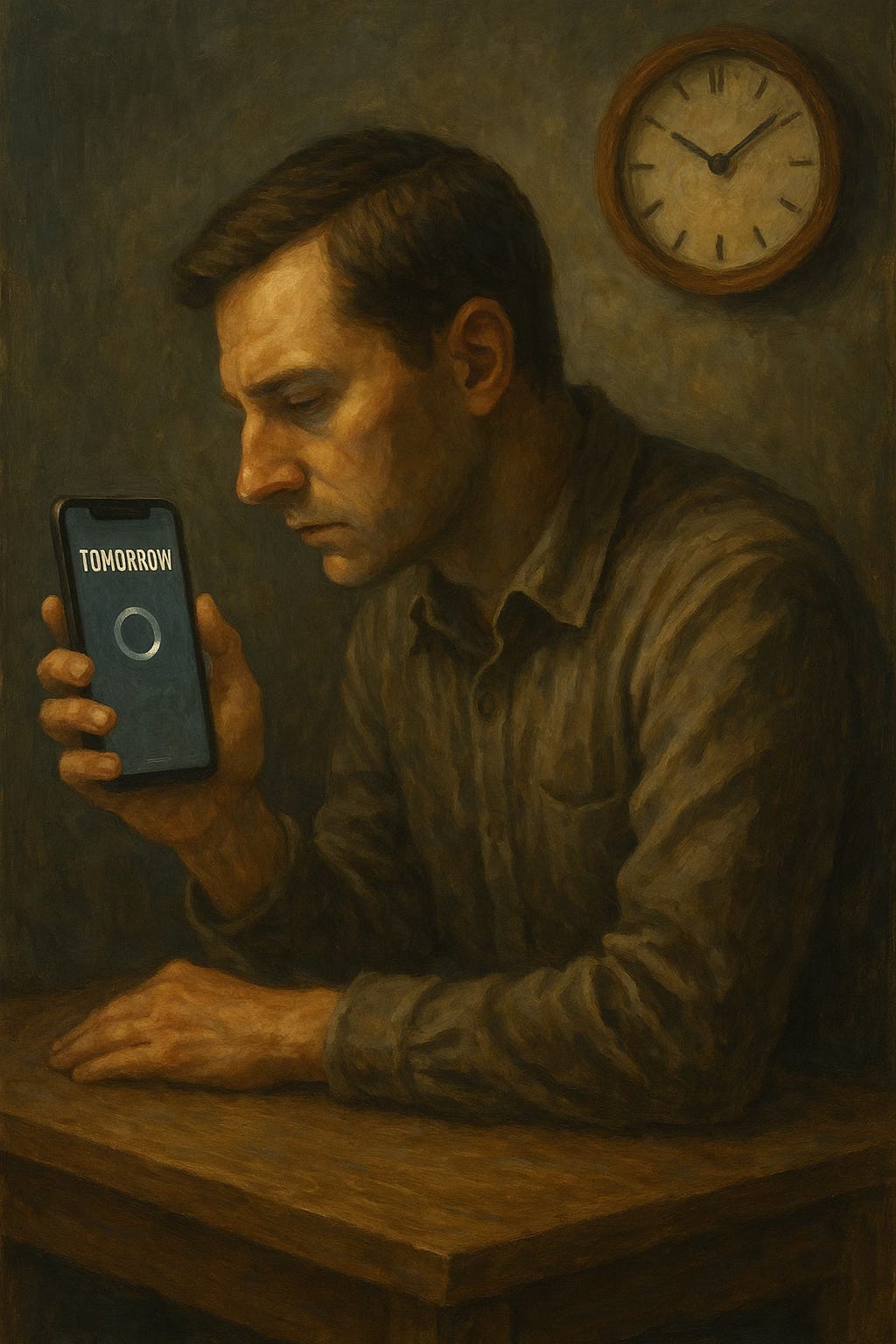We live in an era defined by perpetual anticipation. Every platform, every device, every application makes a promise: tomorrow it will be faster, easier, more connected. We are invited to live not in the present but in a suspended state of expectation, a future always just one update away. And yet, tomorrow never truly arrives—it only renews itself in the endless cycle of digital promises.
This condition shapes not only our technology but our psychology. We are trained to believe in the imminence of transformation: the next software release, the next innovation, the next feature that will “change everything.” But in living for this horizon, we risk losing touch with what is here. The promised future becomes a mirage, forever visible yet forever receding. Our days stretch into waiting rooms where fulfillment is postponed in the name of progress.
The danger of such a life is subtle but profound. When every present moment is merely a prelude to a “better” one, we learn to dismiss the here and now as inadequate. We internalize impatience as a virtue and treat incompletion as the natural state of things. But what kind of existence is left when today is always sacrificed at the altar of tomorrow?
If these reflections resonate, I invite you to slow down here. Let these words unfold without haste, as a counterpoint to the constant rush of digital time. And if you find that this space gives voice to questions you have quietly carried, I warmly encourage you to become a paid subscriber. Together, we can build a community where reflection itself is cherished, where not every moment needs to be optimized, and where presence reclaims its dignity.
To understand the fragility of digital promises, we must first see how they are engineered. Marketing thrives on a careful cultivation of incompleteness. A new phone is launched not because the old one has failed but because it must appear lacking. We are persuaded that our present is broken in order to desire the promise of repair. This cycle never resolves because its engine is dissatisfaction.
The French philosopher Jean Baudrillard observed that consumer society thrives not on needs but on desire itself—desire that is never fully satisfied. The promise of tomorrow is not meant to be fulfilled but perpetuated. Each digital promise is less a solution than a lure, keeping us suspended in anticipation, addicted not to outcomes but to the act of expecting.
Concrete life shows this daily. How many times have we awaited a system update with excitement, imagining smoother performance or new features, only to discover that very little has changed? The difference between the expectation and the reality is almost always anticlimactic, yet the machinery of anticipation resets instantly for the next update. We rarely pause to ask why we keep believing in the cycle.
The effect is not limited to technology. Our working lives are infused with the same logic. Corporate systems perpetually speak of “roadmaps,” “strategic transformations,” and “upcoming integrations.” Each quarter, new promises are unveiled, but the reality on the ground shifts far less dramatically. Employees learn to live within a paradox: constantly waiting for the organization of tomorrow while surviving the frustrations of today.
Personal relationships are not immune either. The language of digital communication fosters an ethic of postponement. “Let’s connect soon,” “I’ll reply tomorrow,” “Next week we’ll talk.” These phrases become habitual deferrals, soft promises that rarely find closure. The digital tomorrow replaces real presence, offering the illusion of continuity without the weight of commitment.
The danger is that we stop holding promises accountable. When tomorrow never arrives, we normalize delay as destiny. Instead of asking when the future will come, we begin to treat the present as disposable, a rehearsal space where nothing yet matters fully. Our lives risk dissolving into a perpetual beta version, always under construction, never truly lived.
The wisdom of ancient traditions offers a counterpoint. The Stoics insisted on the sovereignty of the present moment. “While we are postponing, life speeds by,” wrote Seneca. This insight collides violently with our digital condition, where postponement is not an accident but a system. To resist it requires not only personal mindfulness but cultural rebellion: the refusal to accept every promise of tomorrow as progress.
Consider also how this condition reshapes memory. In our constant waiting, we rarely dwell long enough in the present to let it form into memory. Moments dissolve before they crystallize, because their only perceived value lies in being surpassed by something newer. The richness of lived time is traded for the thinness of promised time.
And yet, there is fragility in this system. Digital promises survive only as long as we consent to believe them. When we slow down, when we hold still, when we refuse to surrender today to tomorrow, the cycle falters. The moment we ask, “What if this is already enough?” the machinery of anticipation loses its grip.
In daily practice, this resistance may look small. It may mean savoring a book without looking for the next one, inhabiting a conversation without checking for another, or choosing a tool and staying with it long past its “recommended” expiration. These acts are minor rebellions, but they reclaim today from the dictatorship of tomorrow.
The conclusion must be a return. A return to the peace of presence, to the fullness of incompletion, to the dignity of saying: this moment does not need a promise to justify itself. For all the digital futures awaiting us, the most radical act may be to live as if the present were already whole.

